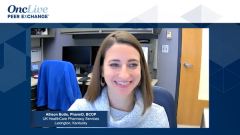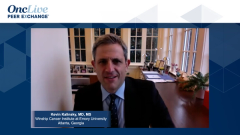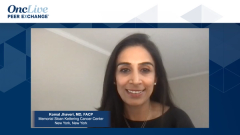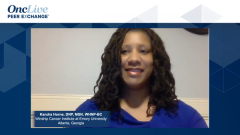
Antibody-Drug Conjugate Therapy in Metastatic Breast Cancer
Allison Butts, PharmD, BCOP, describes what antibody-drug conjugates are and explains the role in metastatic breast cancer treatment.
Episodes in this series

Kevin Kalinsky, MD, MS: Hello, and welcome to the OncLive® panel discussion “Antibody-Drug Conjugates in Breast Cancer: Strategies for Toxicity Management.” My name is Kevin Kalinsky, and I’m an associate professor at the department of hematology medical oncology and the director of the Glenn Family Breast Center at Winship Cancer Institute of Emory University [in Atlanta, Georgia]. I’m joined by some esteemed colleagues, who I will introduce. Dr. [Komal] Jhaveri is an attending [physician] in breast medicine service and early drug development and the section head of the endocrine therapy research program at Memorial Sloan Kettering [Cancer Center] in New York [New York]. Welcome, Kamal.
Komal Jhaveri, MD, FACP: Thank you so much. Thanks for having me.
Kevin Kalinsky, MD, MS: Allison Butts is the program director of the hematology and oncology pharmacy residency and an assistant adjunct professor at the UK [University of Kentucky] College of Pharmacy in Lexington, Kentucky. Allison, thank you for joining us.
Allison Butts, PharmD, BCOP: Thank you.
Kevin Kalinsky, MD, MS: Kandra Horne, who I get to work with on a regular basis, who's a Women's Healthcare Nurse Practitioner, Breast and Gyn-MedOnc [Gynecological Medical Oncology] at Winship Cancer Institute with Emory Healthcare in Atlanta, Georgia. Kandra nice to see you.
Kandra Horne, DNP, MSN, WHNP-BC: Nice to see you as well. Thank you for having me.
Kevin Kalinsky, MD, MS: Today we’re going to discuss how we approach the management of patients with breast cancer who are receiving antibody-drug conjugates. As we know, the landscape has changed with the clinical utilization of these agents, and there are more coming down the pike. We’ll review clinical case scenarios to identify strategies for the management of common toxicities. Why don’t we just dive in? Allison, as I mentioned in the introduction, a lot has occurred in the space with antibody-drug conjugates. To take an aerial view, do you mind talking through the technology and the mechanism of action of these agents and the components of these drugs?
Allison Butts, PharmD, BCOP: Absolutely. I always describe to patients that these drugs are kind of like the Trojan horse of cancer care, meaning that we're directing another drug to their cancer cells and sneaking it in, in a way. There are three main components of the antibody-drug conjugate: the antibody, the payload, and the linker. The antibody is necessary to target the drug to its site of action. Of the currently available antibody-drug conjugates, we have anti-HER2 [human epidermal growth factor receptor 2] directed as well as the Trop-2 [trophoblast cell surface antigen 2] directed antibody which I'm sure we'll talk about later. The payload is the next important component, which is the toxic cytotoxin therapy that is being delivered to the cell to try and induce cell death. We have a couple of agents that we'll talk about. We've got an anti-microtubule cytotoxin as well as some topoisomerase inhibitors on the market as well. Perhaps the most interesting and important part of this drug class is the linker, which is what connects the cytotoxin to the antibody backbone.
Kevin Kalinsky, MD, MS: That’s an interesting analogy. In my clinic, I often describe it as like a GPS: it’s targeting exactly where to go to deliver the cytotoxins. The Trojan horse is a great analogy. If you wouldn’t mind, talk about the rationale for the use in metastatic breast cancer.
Allison Butts, PharmD, BCOP: There are a couple of reasons why these drugs are really useful. For 1, we’ve got obvious targets that are highly effective in the treatment of breast cancer. HER2 is probably the most notable and widely studied of those targets. From a drug development standpoint, it makes a lot of sense to optimize that target-mediated drug disposition that we could achieve with these drugs. We’ve got a well-tested, well-validated antibody backbone available that we can tether this cytotoxin into and then attempt to minimize toxicity and maximize efficacy, all in 1 particular drug.
Transcript edited for clarity.



































